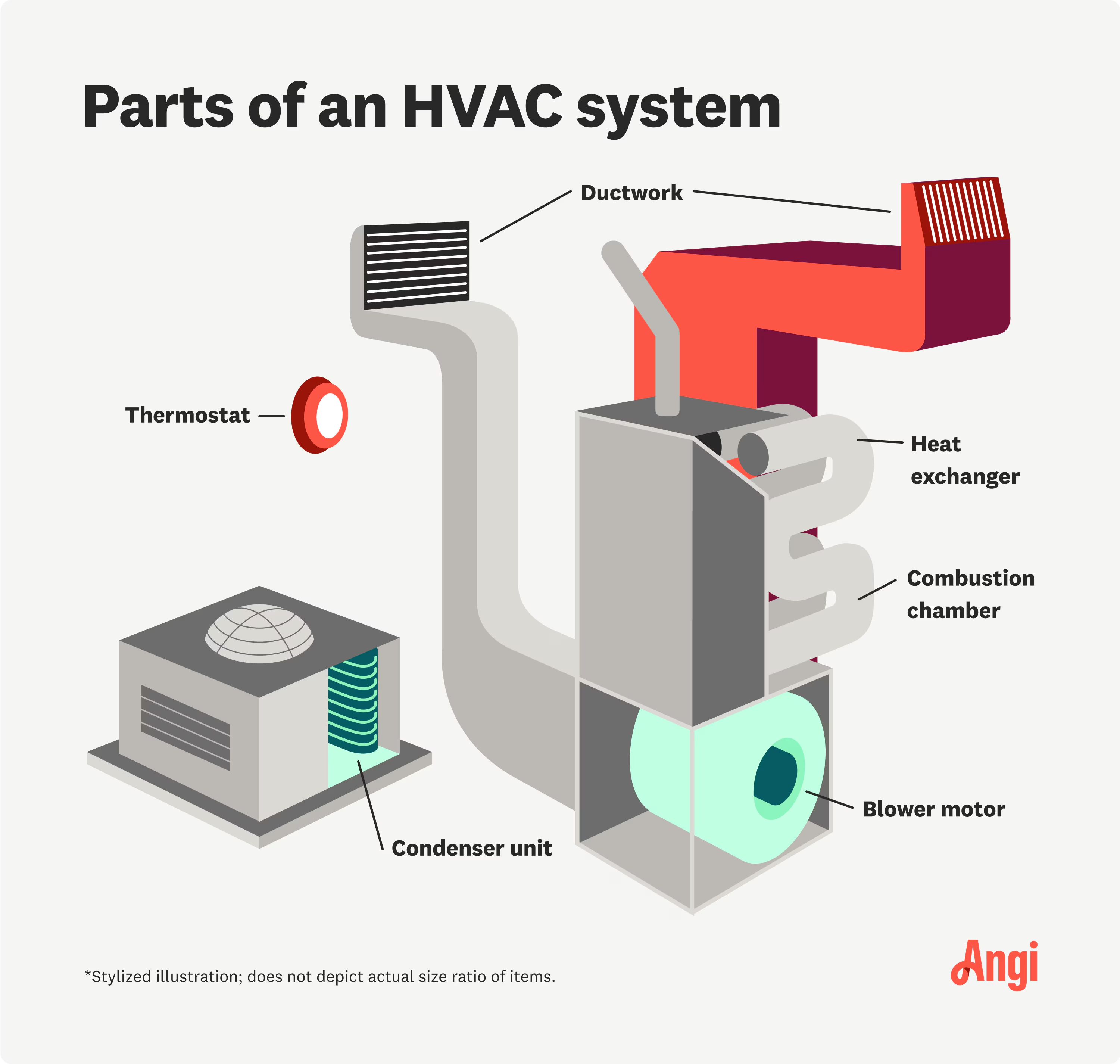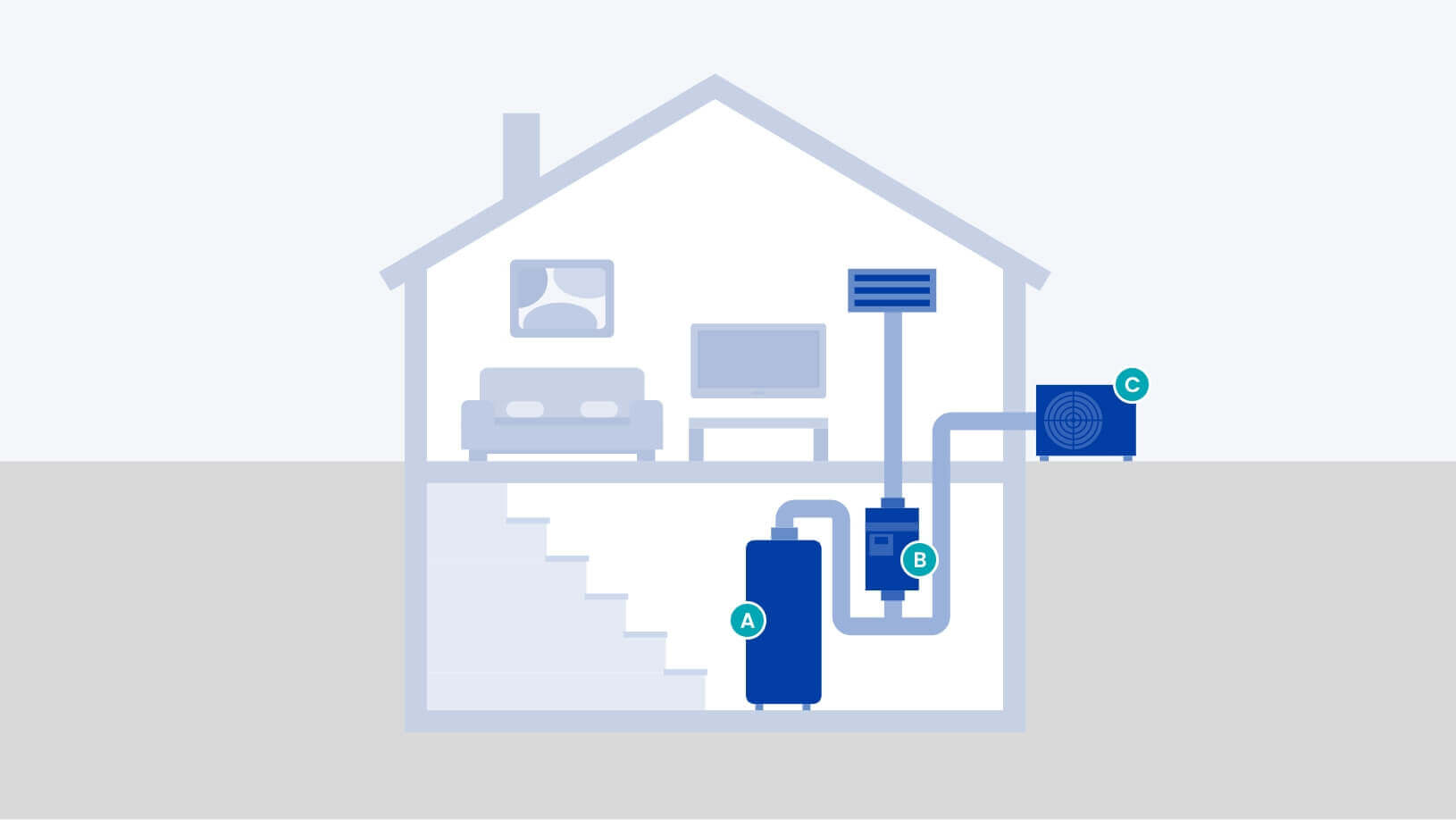Checking Out the Essential Components of an Effective Heating And Cooling System
An efficient HVAC system is improved a number of crucial elements that function in harmony. Each part, from the thermostat to the ductwork, plays a vital duty in preserving convenience and energy performance. Recognizing these aspects is important for optimizing performance and improving interior air quality. As one analyzes these parts, the detailed connections in between them expose insights right into boosting total system effectiveness. What particular factors contribute most to this performance?
The Function of the Thermostat in A/c Performance

Although typically ignored, the thermostat plays a vital duty in the performance of a/c systems. HVAC experts. This little device works as the primary nerve center, controling temperature settings and ensuring optimal comfort within a room. By accurately sensing the ambient temperature, the thermostat communicates with the heating, air, and air flow conditioning units to preserve the preferred climate
An effective thermostat reduces energy intake by turning on the a/c system only when needed, thereby stopping too much home heating or air conditioning. Modern wise and programmable thermostats improve this performance better by allowing users to establish timetables and remotely change settings, adapting to day-to-day routines.
In addition, the placement of the thermostat is vital; improper area can result in incorrect temperature level analyses, leading to ineffective procedure. Generally, a well-functioning thermostat not just enhances convenience but additionally contributes noticeably to energy cost savings and the long life of the a/c system.
Recognizing the Significance of Air Filters
Air filters serve a necessary feature in a/c systems by assuring that the air circulating within an area remains tidy and healthy. These filters catch dust, allergens, and various other pollutants, preventing them from being recirculated throughout the environment. By capturing these particles, air filters add to enhanced interior air high quality, which can greatly benefit passengers' health, particularly those with allergies or breathing conditions.
In addition, maintaining clean air filters enhances the effectiveness of HVAC systems. Stopped up filters can limit airflow, causing the system to work harder to maintain preferred temperatures, bring about boosted power consumption and greater utility bills. Regularly replacing or cleansing filters is a crucial maintenance step that can lengthen the lifespan of cooling and heating equipment. Inevitably, recognizing the significance of air filters allows house owners and building managers to take proactive procedures to guarantee a well-functioning, reliable a/c system that promotes a comfortable and risk-free indoor setting.

The Performance of the Furnace and Warmth Pump
Heaters and warmth pumps are important parts of a/c systems, accountable for offering heat during chillier months. Furnaces run by home heating air via combustion or electric resistance, after that distributing it throughout the home through air ducts. They typically supply quick home heating and can be sustained by all-natural gas, power, or oil, relying on the system type.
Conversely, heatpump transfer heat instead than create it. They remove heat from the outdoors air or ground, also in low temperatures, and transfer it inside your home. HVAC experts. This dual capability allows heat pumps to additionally give air conditioning in warmer months, making them versatile options for year-round climate control
Both systems call for correct maintenance to assure performance and long life. While furnaces master extreme chilly, heatpump can be useful in modest environments. Comprehending their distinct performances help homeowners in picking the most ideal choice for their home heating requires.
Exploring the A/c Device
The a/c unit is an essential element of cooling and heating systems, available in different types to match various requirements. Recognizing the efficiency rankings of these units is necessary for making educated selections about power consumption and expense. This section will certainly explore the diverse kinds of ac system and clear up how effectiveness scores impact efficiency.
Sorts Of Air Conditioners
While various factors affect the selection of air click conditioning systems, understanding the various kinds readily available is important for property owners and building supervisors alike. Central air conditioners are designed to cool whole homes or structures, making use of a network of air ducts for air flow. Window devices provide a more localized service, suitable for single spaces or small areas. Mobile air conditioning system supply adaptability, permitting individuals to relocate the device as needed. Ductless mini-split systems are an additional alternative, combining the efficiency of main systems with the comfort of zoning, as they require no ductwork. Lastly, geothermal systems harness the planet's temperature level for energy-efficient air conditioning. Each kind comes with unique benefits, making educated options essential for reliable environment control.

Effectiveness Ratings Discussed
Understanding effectiveness ratings is vital for choosing the right a/c unit, as these metrics supply understanding into the system's efficiency and energy consumption. One of the most usual ranking for air conditioning unit is the Seasonal Power Effectiveness Ratio (SEER), which determines the cooling result throughout a regular air conditioning period split by the complete electric energy input. A higher SEER suggests better efficiency. In addition, the Power Effectiveness Proportion (EER) is used for gauging efficiency under particular conditions. One more vital metric is the Power Star accreditation, which represents that a device satisfies strict energy efficiency guidelines. By reviewing these scores, consumers can make educated selections that not only enhance comfort however also reduce energy prices and ecological influence.
The Importance of Ductwork and Air movement
Reliable ductwork style and airflow management play vital duties in the overall performance and performance of cooling and heating systems. Appropriate ductwork assurances that conditioned air is dispersed uniformly throughout a room, minimizing temperature level fluctuations and boosting comfort. Well-designed air ducts reduce resistance article to air movement, decreasing the workload on heating and cooling equipment and ultimately reducing energy intake.
Air movement management entails strategically placing vents and registers to boost the circulation of air. This prevents usual concerns such as chilly or hot areas, which can take place when air movement is blocked or inadequately well balanced. Furthermore, the ideal air duct products and insulation can better improve efficiency by minimizing warm loss or gain throughout air transit.
An effective ductwork system not just contributes to energy savings yet can also lengthen the lifespan of HVAC devices by lowering unneeded pressure (HVAC experts). As a result, recognizing the value of ductwork and airflow is important for achieving peak heating and cooling system efficiency
Routine Maintenance Practices to Enhance Performance
Routine maintenance methods are necessary for guaranteeing peak efficiency of HVAC systems. These methods include regular evaluations, cleaning, and necessary fixings to maintain the system running efficiently. Frequently transforming air filters is important, as blocked filters can block airflow and decrease performance. On top of that, professionals need to check and tidy evaporator and condenser coils to stop overheating and energy waste.
Yearly professional evaluations are additionally recommended, as experienced technicians can identify possible issues before they escalate. Oiling relocating components minimizes damage, adding to a much longer life expectancy for the system. Furthermore, making sure that the thermostat operates appropriately help in keeping optimal temperature control.

Often Asked Concerns
How Often Should I Change My Thermostat?
Thermostats need to usually be replaced every 5 to ten years, depending on usage and technology improvements. Regular checks are recommended to guarantee peak performance, particularly if experiencing inconsistent temperature control or enhanced power costs.
What Dimension Air Filter Is Best for My HVAC System?
The very best dimension air filter for a cooling and heating system differs by system layout. Typically, it's vital to consult the owner's handbook or examine the existing filter dimensions to ensure peak performance and air high quality.
Can I Install a Heat Pump Myself?
Mounting a warm pump independently is possible for experienced individuals, however it calls for knowledge of neighborhood codes and electrical systems. Working with an expert is recommended to ensure correct setup and ideal system efficiency.
Just how Do I Know if My Ductwork Is Efficient?
To identify ductwork performance, one ought to look for leaks, action airflow at vents, examine insulation quality, and review temperature distinctions between supply and return ducts. Specialist analyses can give extensive insights right into total performance.
What Are Indications My Heating And Cooling Requirements Immediate Upkeep?
Indications that an a/c system needs prompt maintenance include unusual noises, irregular temperature levels, boosted official website power expenses, unpleasant smells, and frequent biking. Dealing with these problems immediately can stop additional damage and guarantee optimal system performance.
Air filters serve a crucial function in Heating and cooling systems by assuring that the air circulating within a room stays clean and healthy and balanced. Furthermore, maintaining tidy air filters boosts the performance of Cooling and heating systems. Ductless mini-split systems are an additional alternative, incorporating the effectiveness of main systems with the comfort of zoning, as they call for no ductwork. Comprehending efficiency rankings is necessary for choosing the best air conditioning system, as these metrics give insight into the system's efficiency and energy consumption. The best size air filter for a HVAC system differs by device design.